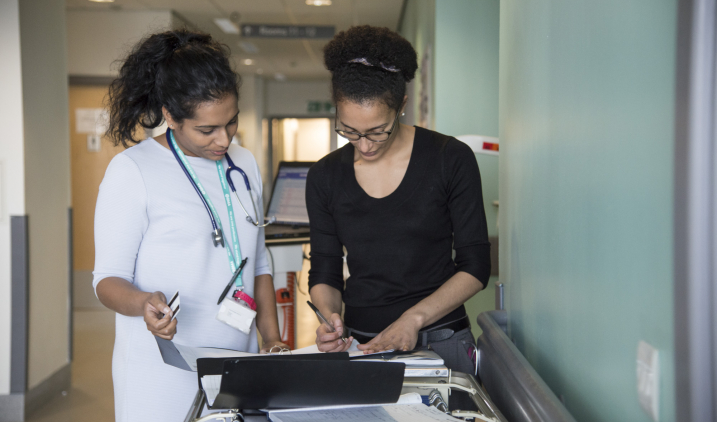Endocrinology and diabetes

Life as an endocrinologist or diabetologist
Predominantly an outpatient specialty, some of your patients will require hospital admission for you to investigate and manage their condition. In addition, you’ll often support primary care (GPs) in some of the public health challenges such as obesity and type 2 diabetes.
What’s more, at least 15% of all hospital inpatients have diabetes or an endocrine disorder. Increasingly, you’ll manage patients jointly with other hospital-based colleagues. As a specialism that covers the effects of hormones on the whole body, you also have skills that can help across all of general medicine and often help support emergency admissions to hospital for people with a broad range of conditions.
One of the great things about the specialty is there is no typical day. You may see people of all ages with newly diagnosed type 1 diabetes, or diabetic complications or with diabetes in certain circumstances, for example pregnancy. As an endocrinologist, you’ll work in a specialist setting treating patients with a wide range of endocrine disorders. You may be leading team meetings (called multi-disciplinary meetings) or teaching other students or doctors about how to diagnose the more challenging conditions. It is a career that you can mould to your strengths.
Endocrinologists and diabetologists treat conditions such as:
- diabetes mellitus
- thyroid disease
- lipid disorders
- endocrine disorders of the reproductive system, such as polycystic ovary syndrome
- adrenal disease
- bone and calcium disorders
- pituitary disease
- endocrine late effects of cancer treatment
Common procedures include:
- programmed investigations for complex endocrine disorders
- managing endocrine patients and patients with diabetes before and after surgery
- management of diabetic and endocrine emergencies such as ketoacidosis and hypercalcaemia
- managing diabetes and endocrine conditions during pregnancy
You’ll also be expected to perform as part of a large, multidisciplinary team including specialist nurses, allied health professionals and other specialist clinicians, and work across medical wards treating patients with general medical problems.
How about the benefits?
- make a difference
- ability to chose parts of the specialty to focus on
- flexible and part-time working
- high income early in your career
- work anywhere in the world
- excellent pension scheme
- good holiday entitlement
- NHS discounts in shops and restaurants
Must-have skills
- excellent communication skills to manage a wide range of relationships with colleagues, and patients and their families
- emotional resilience, a calm temperament and the ability to work well under pressure
- teamwork and the capacity to lead multidisciplinary teams
- problem-solving and diagnostic skills
- outstanding organisational ability and effective decision-making skills
- first-class time and resource management for the benefit of patients
Entry requirements
Your first step is medical school. Typically, you’ll need excellent GCSEs and three A or A* passes at A level including chemistry for a five-year undergraduate degree in medicine. Many medical schools also ask for biology and others may require maths or physics.
If you already have a degree, you could study for a four-year postgraduate degree in medicine.
You’ll need to pass an interview and admissions test. You’ll be asked to show how you demonstrate the NHS values such as compassion and respect.
Some medical schools look to recruit a mix of students from different backgrounds and geographical areas, so your educational and economic background and family circumstances could be considered as part of your application.
